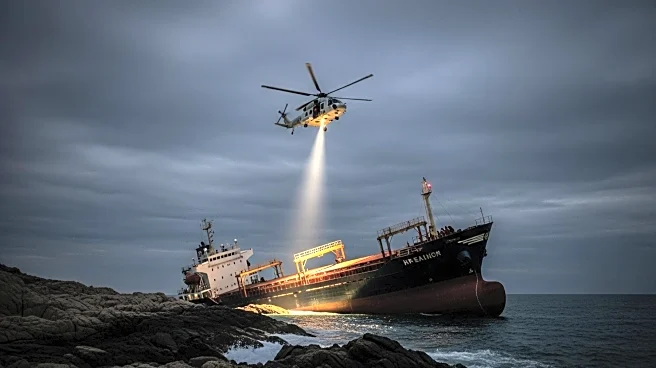What is the story about?
What's Happening?
Turkish authorities executed a helicopter rescue operation for the crew of a Tanzanian-flagged cargo ship, Rapid, which ran aground in the Sea of Marmara on September 18. The vessel, carrying gypsum from Bartin, Turkey, to Chornomorsk, Ukraine, encountered severe weather conditions that prevented a Coast Guard vessel from reaching it. Consequently, a helicopter was deployed to airlift the seven crew members to safety. The crew was unharmed during the incident. The ship, built in 1991, has a history of safety issues, having been detained in August for 13 days due to 30 identified deficiencies, including inoperative navigational alarms and missing safety documentation.
Why It's Important?
This incident underscores the ongoing challenges in maritime safety and the importance of adhering to international safety standards. The Rapid's history of deficiencies highlights potential risks to crew safety and environmental protection. The successful rescue operation demonstrates the effectiveness of coordinated emergency response efforts, but also raises questions about the enforcement of safety regulations in international waters. The incident may prompt further scrutiny of maritime safety practices and regulatory compliance, impacting shipping companies and international trade routes.
What's Next?
Salvage operations for the grounded vessel will commence once weather conditions improve. The incident may lead to increased inspections and stricter enforcement of safety regulations for vessels operating in the region. Shipping companies might face pressure to enhance safety measures to prevent similar occurrences. Additionally, there could be diplomatic discussions between Turkey and the vessel's flag state, Tanzania, regarding compliance with international maritime safety standards.
Beyond the Headlines
The grounding of the Rapid highlights broader issues in maritime safety, including the challenges of maintaining older vessels and the potential environmental risks posed by such incidents. The lack of environmental pollution in this case is fortunate, but it serves as a reminder of the potential consequences of maritime accidents. The incident may influence future policy discussions on the regulation of aging ships and the need for updated safety protocols.















